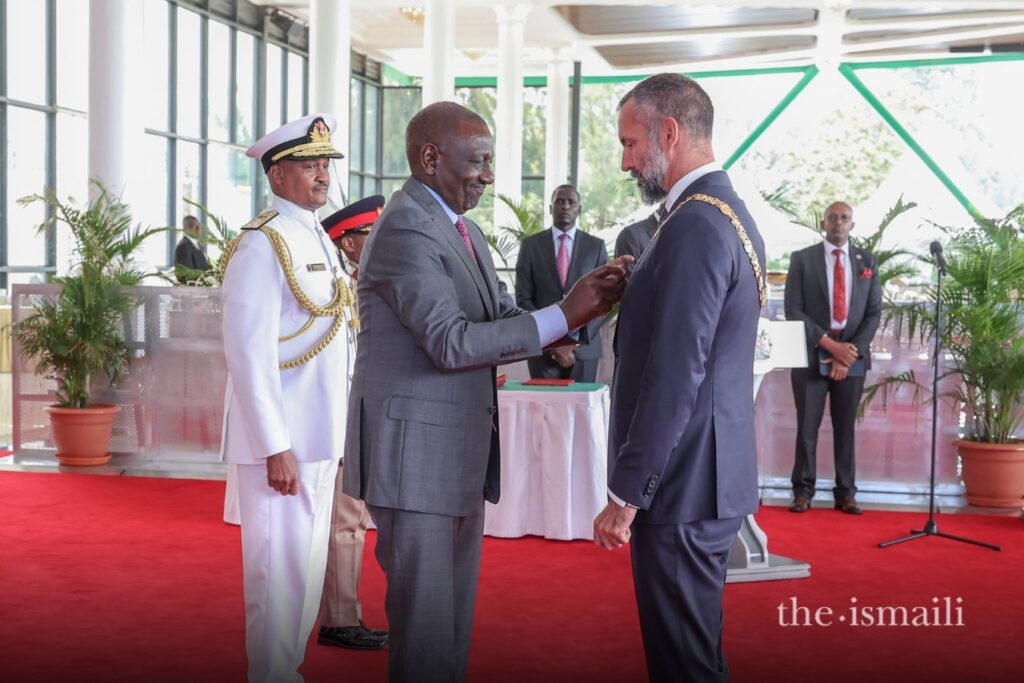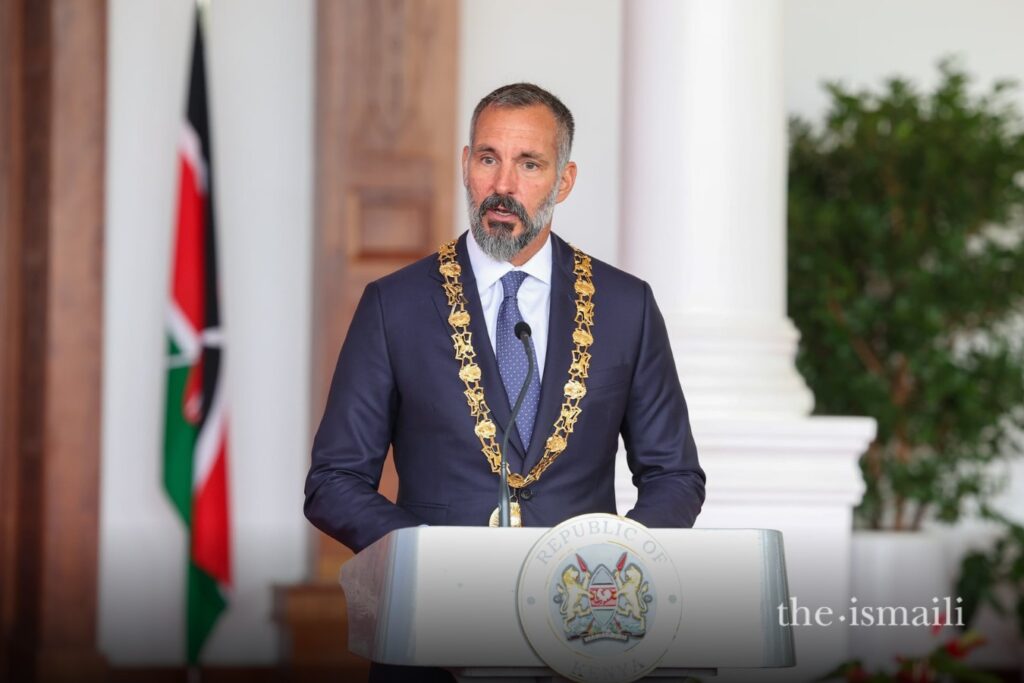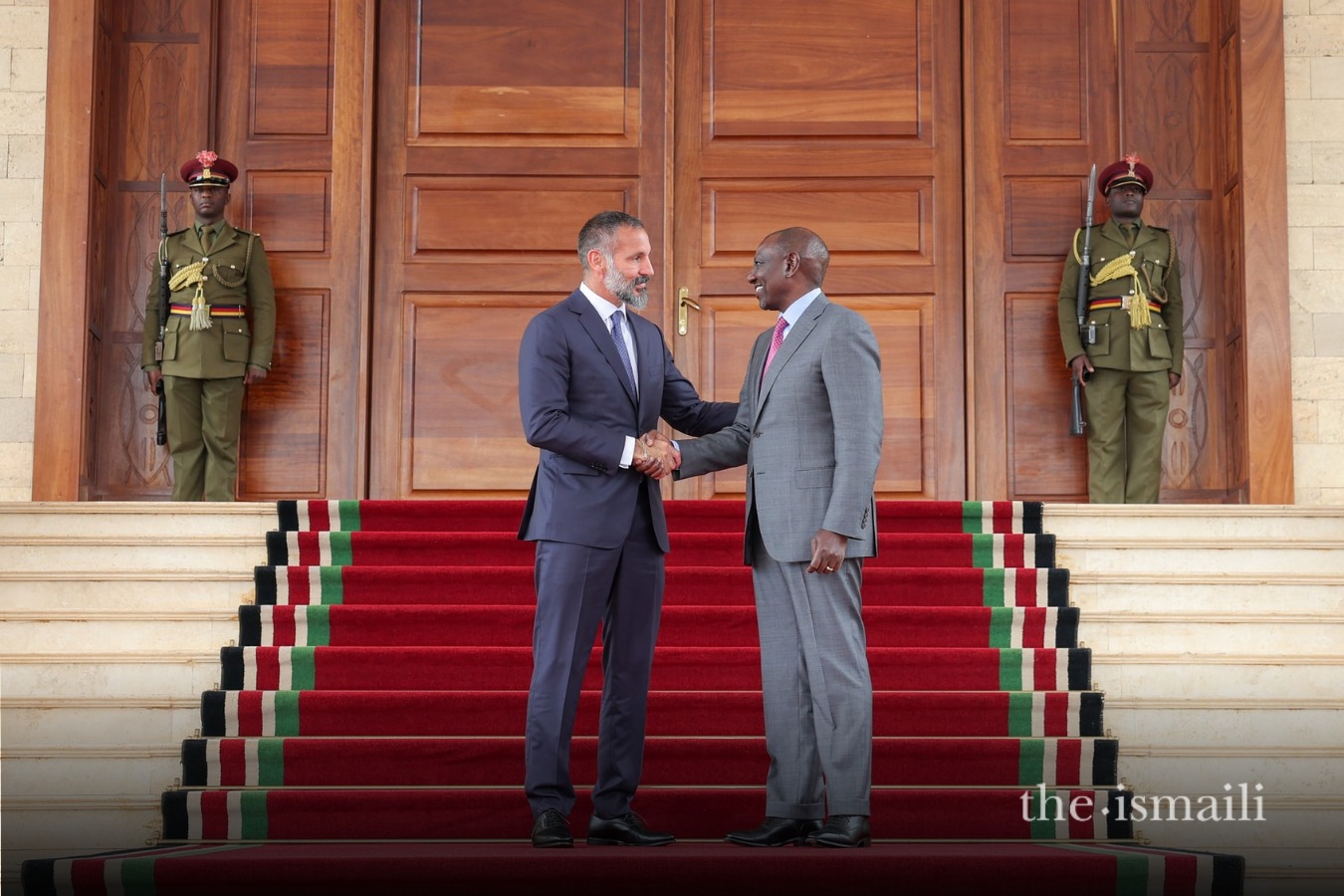His Highness Prince Rahim Aga Khan, the 50th hereditary Imam (spiritual leader) of the Shia Ismaili Muslims, is in Kenya for a three-day official visit that mixes diplomacy, heritage and development. This is his first visit to the country since his appointment as Imam, succeeding his late father, Prince Karim Aga Khan IV, in February 2025. The visit has significance, both symbolic and practical, as part of his role as Chairman of the Aga Khan Development Network (AKDN), demonstrating the ongoing ethos of partnership that has been in place for many decades between the Ismaili Imamat and the Government of Kenya.
The growth paradigm of the Ismaili Imamat in Kenya over generations has been constructed on an ethic of volunteerism and service, institutional sustainability, and partnerships. It is vital to the national interest of Kenya and the Ismaili community that lives in Kenya and its jurisdiction. It is that model that has been the basis for Prince Rahim’s visit to Nairobi, including his meeting with President William Ruto and senior Government of Kenya officials, as well as visits to the AKDN institutions. The Imamat’s time-honoured model is particularly meaningful at a time when African states are themselves seeking partners in development that are long-term and value-based.

During the Aga Khan’s meeting at State House in Nairobi, President Ruto extended congratulations to Prince Rahim on his accession to the Imamat and thanked him for the large role Prince Rahim’s late father played in Kenya’s development. The impact of Prince Karim Aga Khan IV was extensive in Kenya and guided the work of the AKDN up until today. During the official luncheon, the President conferred Prince Rahim with Kenya’s highest civilian award, the Chief of the Order of the Golden Heart of Kenya (C.G.H.). Earlier this year, in March 2025, Princess Zahra Aga Khan was conferred the award of the Elder of the Order of the Golden Heart of Kenya (E.G.H.) by President Ruto for her continued service to the health system, education system, and social welfare programs of the Aga Khan Development Network.
In his written address, President Ruto reflected on the tangible outcomes of the Imamat’s collaboration with Kenya. The AKDN-affiliated health centres now receive more than 900,000 patient consultations each year. Approximately 1,000 public schools receive assistance from the AKDN and the Network has also helped plant approximately 1.5 million trees in Kenya during the last three years. These are tangible signs of development spread throughout Kenya’s central narrative of advancement, being a success that belongs not just to the Ismaili community but the Aga Khan’s legacy of development.
For over a hundred years, the Ismaili Imamat and Kenyan institutions have worked together to enhance quality of life for all Kenyans, without distinction as to background. This ethos spans across most of the developing world where the AKDN has projects, including neighbouring nations such as Uganda, Tanzania, Mozambique and Madagascar to name a few.
Prince Karim Aga Khan IV, the Imam of the Shia Imami Ismaili Muslims who served from 1957 until February 2025, was a familiar figure in Kenya’s development arena and one of the nation’s most longstanding international development partners. His approach was methodical and non-ideological, based on building local capacity intended for long-term development. The institutions he created during his Imamat serve as the foundation for today’s health, education and civil society in Kenya.

The Aga Khan University Hospital, Nairobi has evolved into a major regional centre of modern high-tech medicine, teaching and training. It provides specialty care and medical education for professionals throughout East Africa. It is one of a small handful of hospitals in Sub-Saharan Africa to be accredited by the Joint Commission International, which establishes global norms for hospital quality and safety. In Mombasa, numerous students, often from deprived backgrounds, have access to a world-class education from the Aga Khan Academy. Its International Baccalaureate (IB) program is designed to build ethical leaders and global citizens.
The AKDN is about impact. Its institutions have helped set Kenya’s media agenda, through the regional media giant The Nation Media Group, which was launched by Prince Karim in 1959. Today, through the Aga Khan University’s Graduate School of Media and Communications, it is enabling graduates to lead media through innovation, which is part of the Imamat’s commitment to a free press and independent media—a voice to the country’s civil society.
Today, Prince Rahim Aga Khan, who has played key roles in the AKDN for more than two decades, is well acquainted with Kenya and the East African region. Under his leadership, the priorities of the Imamat have evolved to fit a changing world. His emphasis on sustainability, ingenuity, and empowering youth resonates well with national aspirations in Kenya under Vision 2030 and the Bottom-Up Economic Transformation Agenda (BETA). His vision for development, in particular around tackling climate change, digital inclusion, and inclusive growth, reflects Kenya’s aspiration to move away from old-fashioned aid to resilient, home-grown solutions.
As Kenya grapples with the demands of the need for economic growth and the need to tackle structural inequality, the model of the Imamat provides a working alternative. It is based on ethical principles, long-term institutional investment, and strong local ownership. Nowhere is this more evident than in the activities of Industrial Promotion Services (IPS), the AKDN’s development-finance arm.
AKDN’s environmental and rural development work is also expanding. Reforestation, climate-smart farming, and clean water access initiatives now benefit whole communities in arid and semi-arid regions. These are programmes that connect science to indigenous knowledge and communities. They are also in line with Kenya’s national obligations under the Africa Climate Summit and other climate finance strategies in the African Union.
The Ismaili community in Kenya, despite being small in number, has helped shape Kenya over the past century. Its members work in every field as doctors, teachers, business professionals and volunteers. The ethic of service in the community is not aspirational; it is operational. Be it organizing health camps, sponsoring education, disaster relief or eco-friendly initiatives, the community takes pride in being a pivotal part of the social fabric of the country.
Prince Rahim’s visit to Kenya this week underlines a renewed commitment to the country. His meetings with President Ruto and government leaders have demonstrated a common understanding: long-term partnerships, based on values, are what shape lasting national development.
As Kenya enters its next phase of development, from urban sprawl to regional integration, the values offered by the Imamat are inscribed in structures, in communities, and also in the dreams of the Kenyan people.
The leadership from Prince Rahim suggests continuity with a new direction. His agenda speaks to the challenges that are increasingly shaping African societies: climate volatility, digital disruption and the job prospects of education that doesn’t just produce skilled workers, but also principled leaders. This agenda is especially important in a country like Kenya, which boasts a dynamic population and whose governance is still a work in progress.
Related posts
Meet the Author

Gillion is a multi-concept WordPress theme that lets you create blog, magazine, news, review websites. With clean and functional design and lots of useful features theme will deliver amazing user experience to your clients and readers.
Learn moreCategories
- Africa (12,123)
- Business (562)
- Design (3)
- East Africa (739)
- Guide (7)
- Interior (1)
- Life (1)
- Lifestyle (5)
- Motivation (4)
- People (3)
- Photography (2)
- Rest of Africa (731)
- Review (1)
- Science (72)
- Style (1)
- Travel (5)
- World (173)
Subscribe Now
* You will receive the latest news and updates on your favorite celebrities!



